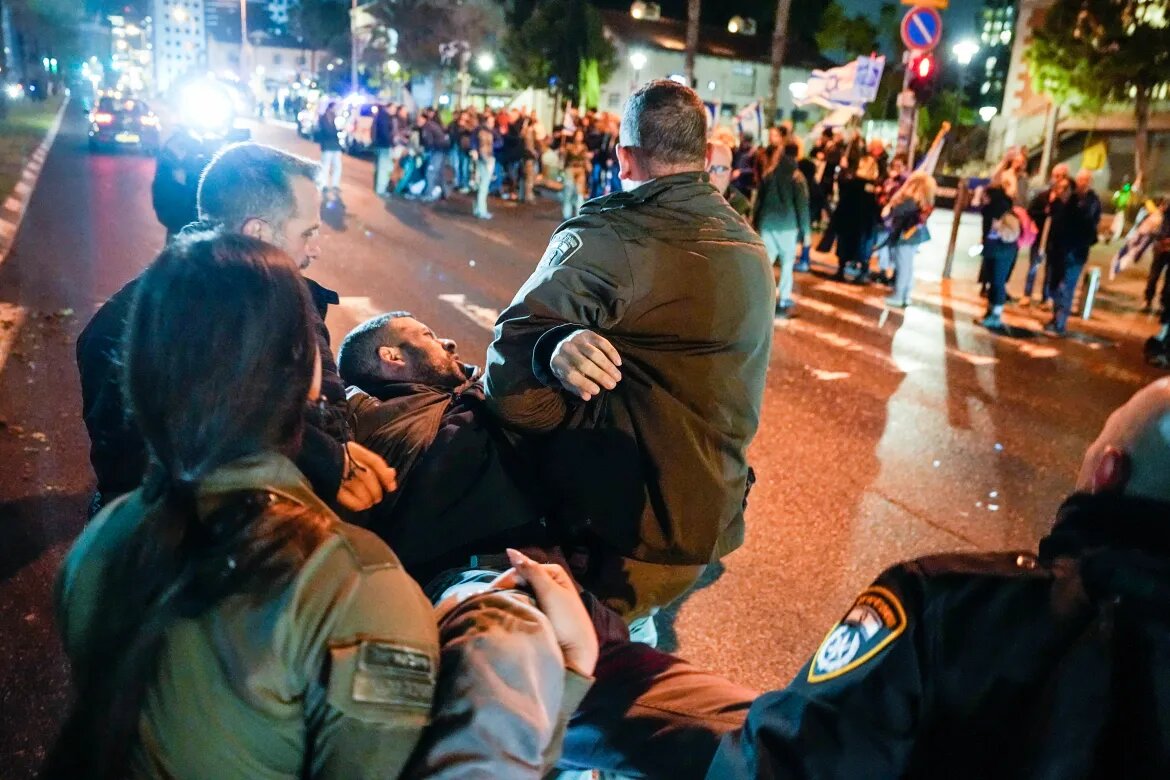Israeli premier in hot water
Can Netanyahu’s career survive Gaza war?

TEHRAN-Israeli Prime Minister Benjamin Netanyahu remains under immense pressure from officials and the public in Israel over his responsibility for the regime’s security apparatus fiasco on October 7.
Fighters of the Palestinian resistance movement Hamas launched Operation Al-Aqsa Deluge against Israeli positions in the occupied territories on October 7 from the Gaza Strip. The military operation shocked the regime to the core because it was an inclusive and unprecedented attack that had occurred for the first time in 75 years of the Israeli occupation of Palestine.
Some 1,140 Israelis were killed in the operation and around 240 Israelis and foreign nationals were taken captive by Hamas. During a seven-day truce in late November, Hamas freed around 100 of the captives in exchange for the release of hundreds of Palestinian prisoners from Israeli jails.
Netanyahu's popularity plummeted following the October 7 attack, with the Israeli public accusing the premier of having failed to sufficiently prepare the security forces for such an attack.
Anti-Netanyahu rallies have also taken place since then on a regular basis with protesters calling for his removal from office.
At the weekend, thousands of Israelis demonstrated in several cities, calling for the dismissal of the Netanyahu cabinet.
They also blamed Netanyahu for his incapability to release the remaining Israeli captives who are held in the Gaza Strip.
Israeli media said fighting erupted Sunday between Israeli protesters and police attempting to disperse crowds in Jerusalem and Tel Aviv.
According to the Yedioth Ahronoth newspaper, police in Tel Aviv arrested several protesters in Kaplan Square in the city center, while hundreds were dispersed by force, and some protest equipment was seized.
It said that “thousands of Israelis gathered at Kaplan Square to demand the resignation of the prime minister and early elections.”
Reports also suggest police “attempted to disperse the protesters in Paris Square, in the center of West Jerusalem, where several of them were arrested.”
Several other areas including Haifa, Caesarea, Kefar Sava, Rehovot and Beersheba witnessed similar protests. The protesters called on Netanyahu to step down and demanded the release of captives.
Netanyahu criticized demonstrations by the families of captives held in Gaza as “useless and contributing to the demands of Hamas.”
He remains vehemently opposed to a permanent cease-fire with Hamas, even if it means bringing the captives home, contending that it would only be a matter of time before the resistance group attacked again.
Presently, the question is that why Netanyahu rejects calls for truce.
The premier seems to consider that the permanent state of war could offer him a lifeline.
Likewise, the continuation of Israel’s genocidal war on the besieged Gaza Strip postpones the moment of reckoning and the work of a possible commission of inquiry to establish responsibility in the regime’s chain of command.
Furthermore, prolonging the fighting also makes it possible to keep quiet about what will happen to the Strip Gaza once the Israeli brutal bombardment is ended.
Recent polling indicates that Israelis are angry at the people charged with protecting them and those who are running the war on Gaza.
According to a recent poll from Tel Aviv University’s Peace Index, more than 50% of Israelis think the Netanyahu cabinet has “no clear goals” in the war on Gaza.
According to another recent poll by an Israeli institute, the Israeli public overwhelmingly disapproves of Netanyahu, with only 15% wanting him to stay in power after the war.
And many seem to believe that the prime minister views the war with Hamas as a political lifeline. A recent Channel 13 survey also found 53% of Israelis believe his wartime decisions are primarily motivated by personal interest.
Netanyahu has vowed to continue the war on Gaza until his regime’s army eliminates Hamas.
But as the war drags on, it becomes increasingly clear that his goal of wiping out Hamas is not feasible.
Earlier this month, Israeli war cabinet minister Gadi Eisenkot appeared to criticize Netanyahu’s management of the Gaza war with Hamas in Gaza. In an interview, he suggested that the talk of complete victory over Hamas is unrealistic and indicated that new elections should be held within months to restore public trust in cabinet following the devastating October 7 attacks.
According to Eisenkot, “Whoever speaks of the absolute defeat [of Hamas in Gaza] and of it no longer having the will or the capability [to harm Israel], is not speaking the truth. That is why we should not tell tall tales.”
Last week, dozens of former Israeli top security officials sent a letter to President Isaac Herzog and Knesset Speaker Amir Ohana pushing for elections and Netanyahu’s removal, referring to him as an “existential” threat to Israel.
It seems that rising public anger over Netanyahu’s lack of movement on bringing the captives home could lead to his removal from office.
It is worth mentioning that even before the October military operation by the Palestinian resistance movement Hamas, Netanyahu’s political career was on thin ice. This is because he was struggling with a corruption trial and mass protests over his cabinet’s judicial overhaul plan.
As the Netanyahu regime prolongs the war, more civilians in the Gaza Strip fall victim to the Israeli army’s brutality.
The inaction of the international community has added insult to injury. The U.S. that has thrown its full weight behind Israel’s deadly war on Gaza, has hampered efforts to bring an end to the regime’s onslaught. Washington and some of its Western allies have shown that they have no scruples about backing Israel’s brutality and barbarism against civilians in Gaza.
Leave a Comment